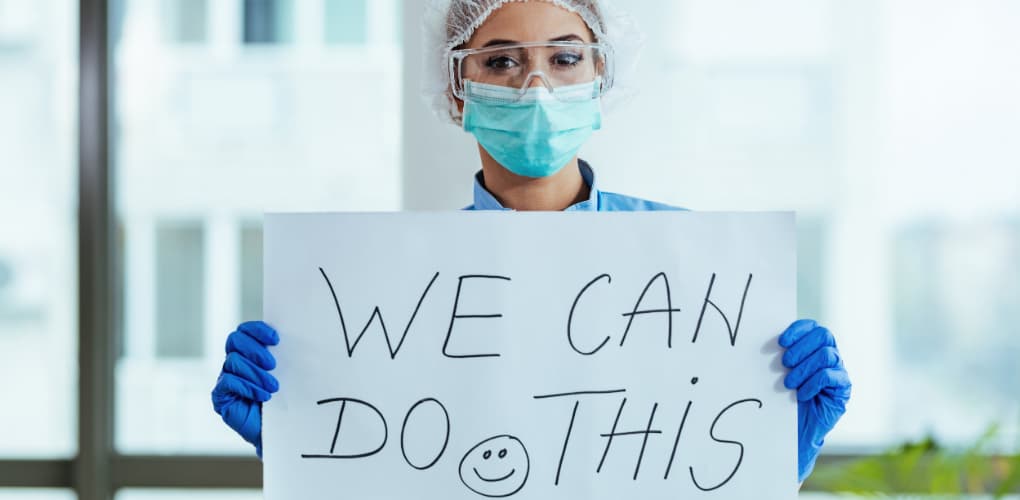< Back to Publications & Resources
5 Ways to Protect Dental Practices During COVID-19

With the potential for a second wave of COVID-19, and with the flu season upon us, it’s vital that dentists remain vigilant in following appropriate guidelines to keep staff, patients and themselves safe, while protecting the practice from legal risks. How to do that encompasses several aspects — understanding regulatory requirements, recognizing what resources are necessary to practice safely, developing new infection control guidelines, creating new workflows and identifying areas of need in anticipation of a future surge.
To help dentists continue adjusting and evolving, MLMIC’s Elizabeth Moy, Risk Management Consultant, and William Hassett, Esq., of the law firm Fager, Amsler, Keller & Schoppmann, LLC, recently hosted a webinar titled “Guidelines for Protecting Your Dental Practice.” The presentation was given in collaboration with the New York County Dental Society. Dental practices vary, but following the roadmap provided in the presentation can enhance dentists’ safety practices during the pandemic.
Here are five key takeaways from that talk.
- Check health agencies often for updates
New requirements, recommendations and findings come out every day. It’s very important that dentists are up to date on the newest information related to COVID-19. The changes will not only impact dental practices, but they could influence your risk management protocol during this unprecedented time. We recommend checking the Center for Disease Control (CDC), the American Dental Association (ADA), the Environmental Protection Agency (EPA), Occupational Safety & Health Administration and Food and Drug Administration (FDA) on a regular basis.
- Take inventory of your dental supplies
Whether your practice is on reduced hours or back to normal, verify that you have enough dental supplies, and make sure the supplies and medications are not out of date. Be mindful that there could be delays or shortages when you order new supplies. By planning early or diversifying your sources, you can make sure that you have the supplies you need, when you need them.
- Consider the availability and safety of your dental health care personnel (DHCP)
Employees’ schedules are still in flux, especially as schools and daycare centers are highly sensitive to the emergence of new cases. Prepare for absenteeism by cross training and potentially expanding your staff. Keep everyone updated on any changes through virtual meetings.
Consider these ways you can provide for your DHCP’s safety:
- Shift the duties of vulnerable staff so they are in less contact with others.
- Allow duties like scheduling and calling insurance companies to be done remotely.
- Provide personal protective equipment.
- Consider installing plexiglass barriers to reduce exposure.
- Take into account your staff’s mental health — look for signs of stress, exhaustion and depression.
- Implement appropriate safety protocols throughout the office
First and foremost, make sure you are in adherence to the CDC’s guidance on infection prevention and control in dental settings during COVID-19. Other appropriate steps include:
- Pre-screen your patients before they enter the office for appointments to make sure they haven’t had symptoms of or possible exposure to COVID-19.
- Require visitors to wear a face covering that covers both the nose and mouth.
- Implement physical distancing in the office by spacing chairs six feet apart and limiting the number of people in common spaces.
- Encourage online payment to minimize time in the office.
- Post signage reminding patients to wash their hands, avoid touching their face and keep a safe distance from others.
- Remove magazines, toys and anything else that could be a source of infection.
- Remain in contact with your liability insurance carrier
It’s important to keep your liability insurer updated on any changes to your practice. Resuming a full work schedule, implementing new hours of service or adding telehealth could all impact the coverage needs of your practice.
Also, remember to have a plan for patients who lost their health insurance during the pandemic. By instituting a clear procedure that includes written documentation of your communication with the patient, you can avoid legal claims of abandonment.
Watch the full webinar here for more tips and details on practicing safely. MLMIC has assembled a number of COVID-19 resources on our website and will continue to keep policyholders informed of pandemic-related developments.
Our insureds also have access to MLMIC’s toll free 24/7 Legal Hotline: (855) FAKS-LAW (1-855-325-7529). Our experts are available to help you address the challenges that may arise as you continue to care for patients through the nationwide response to the coronavirus emergency.



